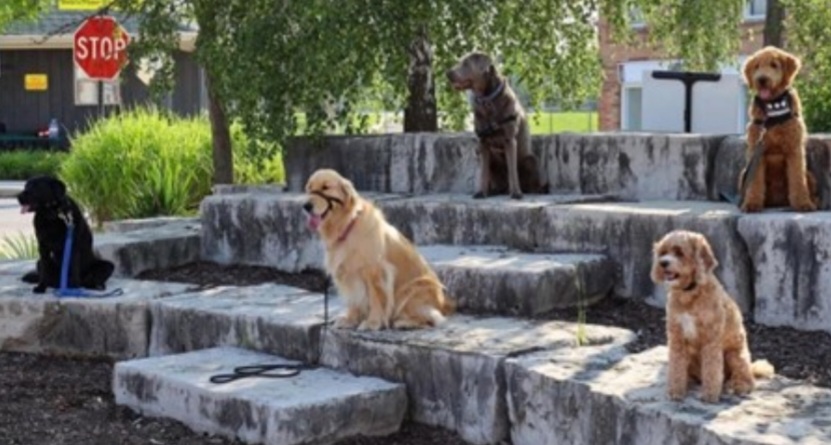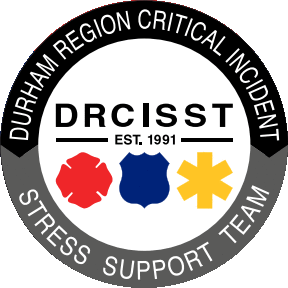DRCISST Canine Team Development
Canine Trainer: Trevor De Cristofaro
Approximately two years ago I was contacted by a good friend and executive member of the Durham Region Critical Incident Stress Support Team (DRCISST) and asked to look at their current canine program to see if I had any suggestions for its development. I was absolutely thrilled by the request. Being involved with dogs for over 25 years in various capacities I knew I was up for the challenge. Through training experience in family obedience, behavior modification, K9 enforcement and canine therapy, I have developed a great deal of fondness and respect for our canine/handler teams that volunteer their time to help others through canine therapy. This was an opportunity I was looking for, an opportunity to utilize my skills and to give back to those who give so much to our communities every single day.
I have worked with an amazing team at the Centre for Addiction and Mental Health (CAMH) as their canine evaluator for the last 15 years. With this experience, I had a good idea of the direction I wanted to head and possible changes I’d like to make to best suit the DRCISST Crisis Canine Program. Because of COVID 19 however, things started off proving to be a bit of a challenge, albeit a challenge that made us look at doing things a little differently to assess what is really required for a Crisis Canine Program vs a typical therapy dog program.
There is no doubt DRCISST’s Canine Program is unique. One of the requirements for their recruitment process is that before you can be considered as a Crisis Canine Handler, you must first prove your dedication as a peer supporter. The majority of DRCISST’s canine handlers are first responders themselves, with all of them at least having experience working with first responders in one way or another. Coming from outside the first responder culture, I knew I had my work cut out for me when building a program with a new team whose trust I’d have to gain and retain. After meeting with a couple of the current canine team members, I was welcomed and lucky to have a small group of dedicated individuals that were willing to take the ride of developing an excellent program. They have been by my side and available to answer any questions, while being instrumental in establishing what we currently have.
In order to get our feet off the ground, we started by recognizing our ultimate goal, which was to expand the current team to develop an organized program consisting of a well-trained, dependable, and certified group of dogs and handlers who could work together as a team; providing Durham Region’s first responders with the many benefits of Crisis Canine support. To reach this goal, there were a few factors we needed to consider.
As a general rule, pet therapy dogs are evaluated at about one year of age. This is generally so the approximate size, expected mature temperament, strengths and weaknesses of each dog have largely been established. As many pet therapy dogs work with vulnerable populations like young children or the elderly, this type of evaluation helps to minimize certain risks such as an excited puppy accidentally knocking someone over. With DRCISST Crisis Response canines however, we are in a unique position as we strictly work with first responders. This allows us to train our pups “on-the-job” so to speak, in a controlled environment where we can pick and choose which situations we want to expose them to from a young age. Once they are ready, the dogs are fully certified for call-out situations like defuses and debriefs or on-scene deployments.
Recently we have started one of our newest canines, a Rottweiler puppy named Hazel. Our experienced team handler has started with general wellness visits at various locations throughout the region. Hazel is learning how to channel her energy to remain calm when visiting with new people, and to differentiate between work and play time. Eventually, Hazel will learn to “work the room” during defuses and debriefs as she progresses through her training. The important thing to keep in mind is that we are lucky enough to be not only flexible with time spent training on site, but we also have the ability to take our young dogs out of service if we need to while they grow and develop (like when they hit that rebellious teenage stage!).

When coaching people with their dogs, I always try to use relatable experiences. There are no stupid, silly or crazy questions when it comes to dog training. Dogs are first and foremost, animals! Each breed will have unique traits depending on what gene pools they derive from, with distinctive temperaments arising depending on what environments they are exposed to. We can adjust training when recognizing these things.
So when we talk about assessment and training, what exactly do we look for in a Crisis Canine candidate?
We first look at temperament. Is the dog generally personable? Do they enjoy the company and attention of people? Are they confident without being overly assertive? Are they intuitive towards recognizing and responding to human emotion? Are they willing to learn? We look for handler/canine pairs who are willing to establish a relationship between each other that extends beyond their own personal family units.
Training starts off by creating a solid foundation of obedience with commands like sit, stay, down, stand, sit-stay, down-stay look-up, recall, proper heeling, sit for examination, and my favorite “go see”. Each of these commands need to produce a response from the dog when given on the first instruction. We then move into more intermediate and advanced training where having 100 percent control of the dog is the most important goal. As the dogs are developing in their training and are exposed to certain situations, the dogs may either be on-lead or off depending on the venue. Our handlers are well versed in recognizing the best course of action depending on the situation at hand. There is always more to learn and more to experience when it comes to training canines – learning never stops!
While attempting to organize our own recent training sessions, Covid-19 restrictions were an extra hurdle to overcome. What normally would be a group effort quickly turned into personal one on one evaluations consisting of a workout and assessment, followed by lots of daily homework for each individual team to work on. Eventually we established a virtual training night which, evidently, is a little out of the ordinary for dog training, however our entire team was able to attend the two hour presentation which outlined the basic foundations of obedience training, progression in routines, behavioral issues, outcomes and policies/rules of the team. The benefit we’ve had is the potential handlers already know what our expectations are; this is a huge benefit to any instructor!
As the province began to re-open, we followed our online training module with an in-person group training session at a fantastic community facility, The Children’s Safety Village; an excellent location that allowed us to assist our handlers with their canine partners, all the while being able to integrate community training in a safe manner without any potential hazards.


